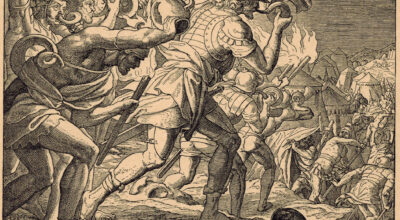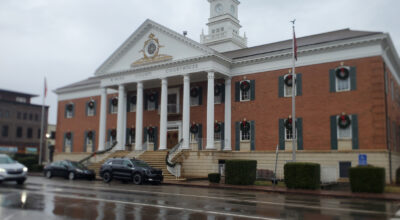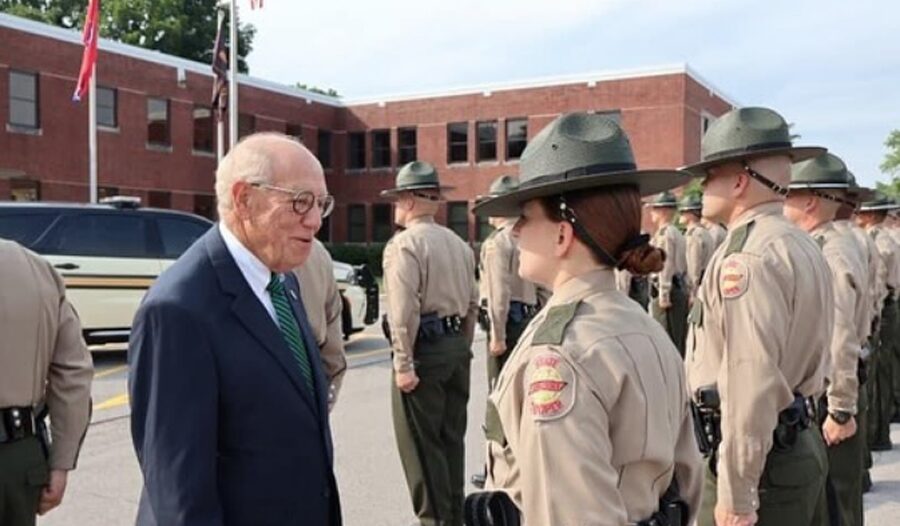
Jeff Long, commissioner of safety in Tennessee, speaks with a state trooper. Troopers are revenue department agents and enforcers upon all commercial traffic. (Photo DOSHS)
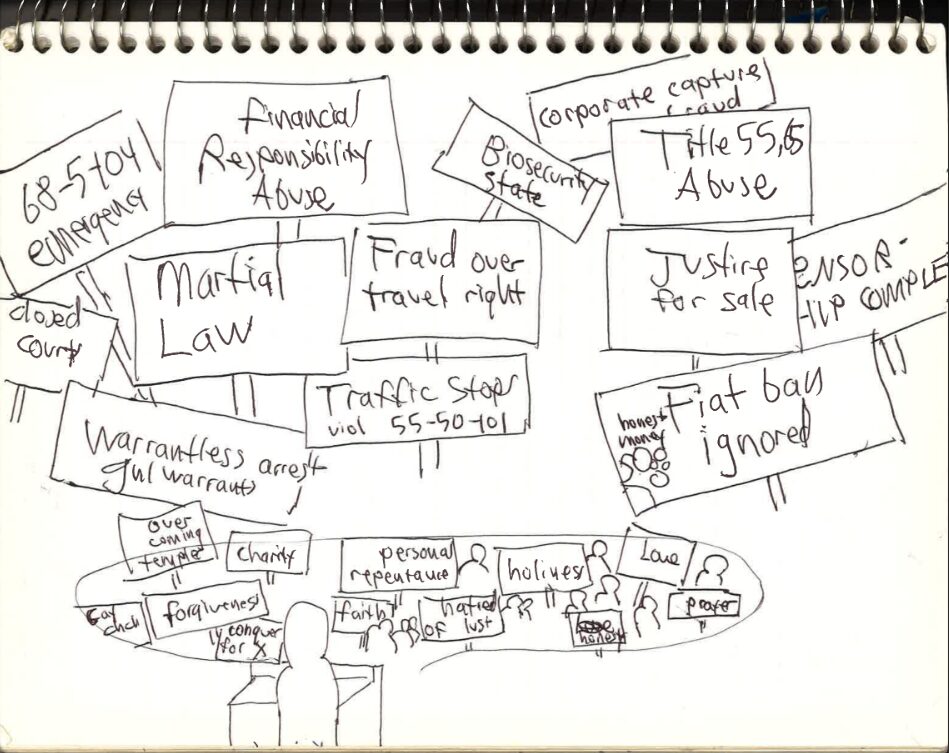
This drawing suggests how the church, via sermons, confines its entire message toward matters of personal piety and personal vices, ignoring the great acts of defiance of the gospel among state actors, governors, sheriffs and others, including “fraud over travel right” and “financial responsibility abuse” and ”traffic stops.” The gospel, privatized and personalized most extraornarily, has made American Christians indiferent to God’s claims on civil authority and courts. (Illustration David Tulis)
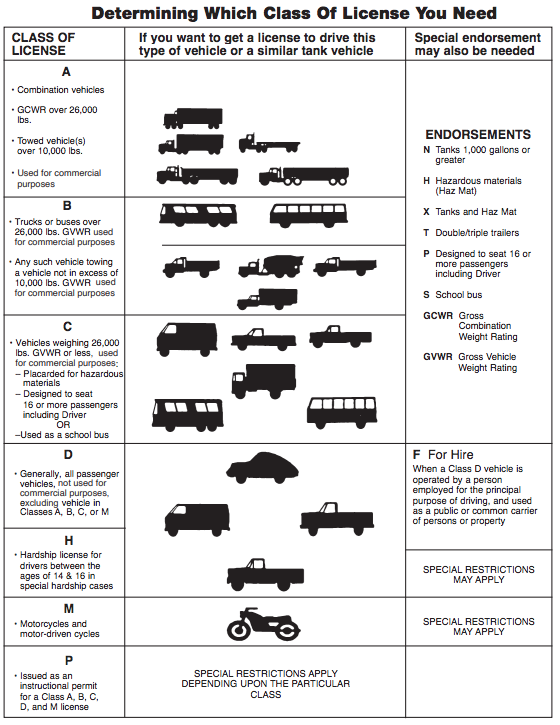
All driver licenses are commercial. The law is styled “the uniform classified and commercial driver license act of 1988.”
CHATTANOOGA, Tenn., Saturday, Dec. 28, 2024 — Christians should be particularly excited about defending the movement on the roads under the precept of pleasure and comfort.They serve a God of joy and delight. He gives many blessings to his people, whom he saves with particular grace, and also to everyone else in the dispensing of common grace.
We are attempting to overthrow widespread fraud by corporate governments among the 50 states using a concept Christians should be most excited about, and that is private and pleasurable use of the road, so that the liberty of the Gospel and of personal prosperity and genius might face less hindrance, more capitalization.
In Tennessee, as in your state, state governments and their courts have accepted these frauds, saying effectively all travel by road in car or truck is for money and pay and gain as merchant. The corporate state has converted everyone into a merchant, effectively into merchandise, or bread.
‘Family purpose’ doctrine
As we contemplate how to overthrow and abolish commercial government in our lifetime, we want again to consider the substance of private or pleasure travel on the people’s roads.
Probably 20% of the users of the roads are private usersin passenger cars, as they are called, or in automobiles or similar conveyances. The balance are commercial users which include haulers, carriers, couriers, bus operators, shippers, transporters and tractor trailer rig operators and logistics companies with their various conveyances operating in commerce under privilege. Everybody behind the steering wheel is an employee or self-employed.
Private travel serves the “pleasure or comfort to the family” under what the courts call the “family purpose” doctrine.
This doctrine comes into view when a legal fiction called the family purpose doctrine that helps courts determine fault and liability when a car owned by a family is used and the person in control of the car causes injury in an accident. Does the liability for the harm attach to the parents, or mom or dad, owners of the conveyance?
See Part 1: Private travel = private use = ‘family purpose doctrine’ = defense liberty
Starr v. Hill, 353 S.W.3d 478 (Tenn. 2011) considers the legal liability in an accident of a father who lends a 16-year-old son a car, though the son does not live in the same house as the man.
The doctrine suggests a defense for those accused of “driving on revoked” and similar privilege-related criminal charges. We work continually to help people make defense by understanding the law, as in the “post office” defense from Crandall v. State of Nevada 73 U.S. 35. 44. 45 (1867). (“Officer, I don’t have any papers to show you, or any document, because I am using the road by absolute right getting to the post office.”)
Starr v. Hill refers to the family purpose doctrine “a court-created legal fiction that employs agency principles to hold the owner of the vehicle vicariously liable” (emphasis added).
Legal fiction can be useful and helpful in administering justice, rulings and court orders. It also is what maintains oppressive Jim Crow practices in your city and county, and in mine. That fiction is that all travel is commercial.
Here’s a choice morsel about family purpose.
The family purpose doctrine is applicable when two requirements have been satisfied. First, the head of the household must maintain an automobile for the purpose of providing pleasure or comfort for his or her family. Scates v. Sandefer, 163 Tenn. 558, 44 S.W.2d 310 (1931). Second, the family purpose driver must have been using the motor vehicle at the time of the injury “in furtherance of that purpose with the permission, either expressed or implied, of the owner.” Redding [v. Barker, 33 Tenn.App. 132], 230 S.W.2d [202] at 205 [ (1950) ]. See also Stephens v. Jones, 710 S.W.2d 38 (Tenn.App.1984); Long v. Tomlin, 22 Tenn.App. 607, 125 S.W.2d 171 (1938).
Strine v. Walton, 323 S.W.3d 480, 489 (Tenn. Ct. App. 2010) (emphasis added)
Liability via ownership, use
Earlier cases show how liability comes to attach to the owner, apart from actual business or employee- or servant-use of an auto. “A father who furnishes an automobile for the pleasure and convenience of the members of his family makes the use of such vehicle for such purpose his affair or business, and any member of the family driving the vehicle with his consent, either express or implied, is the father’s agent, and the father is liable for his negligence” King v. Smythe, 140 Tenn. 217, 204 S.W. 296 (1918).
Note the year of this case — 1918. Four years earlier, Tennessee courts show how liability attaches to two owners of a car,even though the chauffer hired by the brother and sister crashed while serving only one o them. “[T]he driver and the automobile were employed directly in the execution of the purposes of the joint ownership of the automobile and the joint employment of the driver. It was a partnership arrangement, and not a separate interest which each had in the automobile and in the service of the driver” Goodman v. Wilson, 129 Tenn. 464, 166 S.W. 752, 754 (1914).
Judges & their black-robed conceits
Despite laying down the family purpose doctrine, the court from bad habit frames every act and person in terms of commerce. Perhaps you notice it, too. “Vehicle” (not car or automobile). “Passenger” (not guest, rider or occupant). “Driven” (not travel in, controlled or used by). “Operation” (not travel in). The court frames even the liberating instrument in terms of the commercial wrist- and ankle shackles harming us citizens at least 90 years.
When I see the court stuck in the commercial paradigm, I feel like rolling my eyes, throwing up my hands and saying, “There’s no way we can win.”
The family purpose doctrine may have a flank weakness. But it’s one that government lawyers are unlikely to spot. It is that most families are state-created. By that I mean that people who marry under license in Tennessee have children who can arguably be called state property, under the concept that marriage under statute envisions the state as the moving party, enabling man and woman to come together in marital union whereas, without the state, they could not have become married. Denying common law marriage by right, the state gives permission for the union, the fruit of which in children belong to it.
Still, “comfort” and “pleasure” are key elements in our understanding of the fight for practical, day-to-day freedom in my state, and perhaps in yours.
David runs a personal nonprofit fighting and mercy ministry. He thanks you for checks sent directly to c/o 10520 Brickhill Lane, Soddy-Daisy, TN 37379. Also, in GiveSendGo
